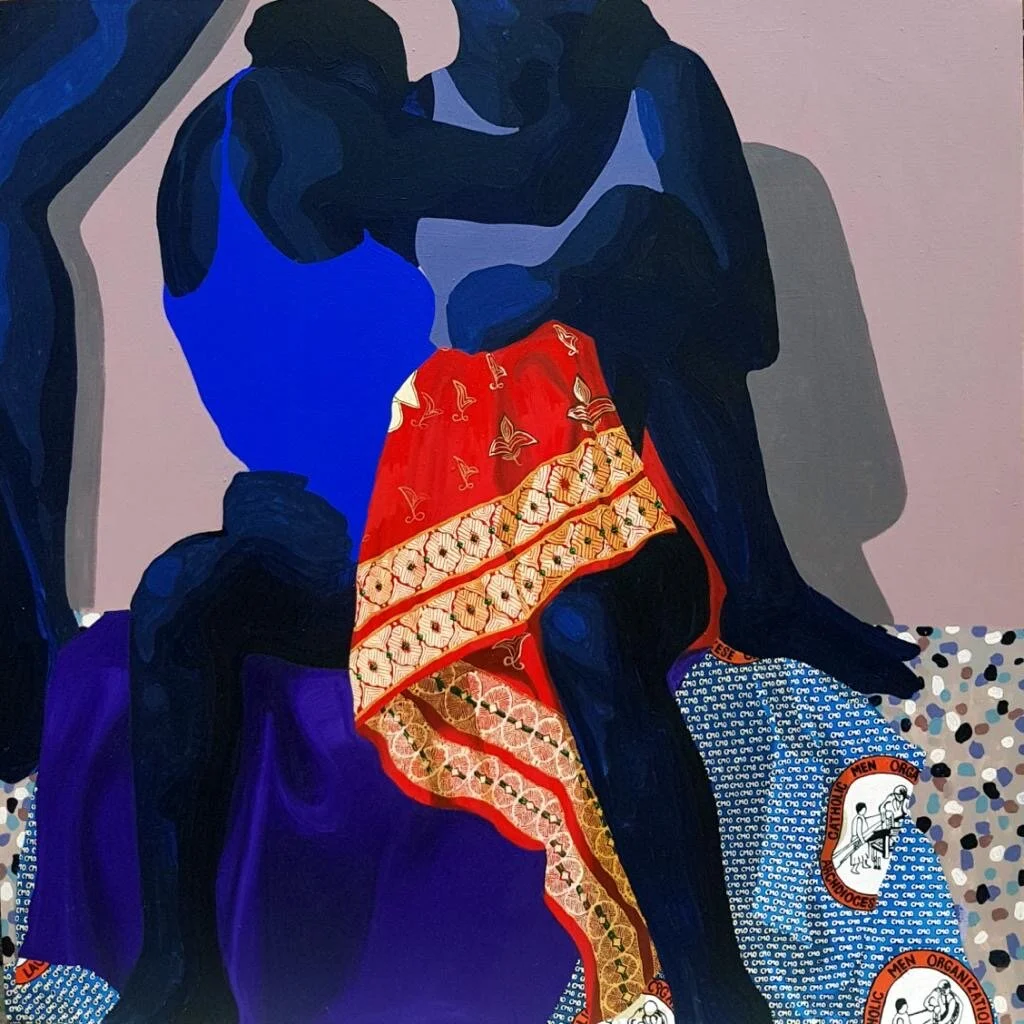Colourful sadness: In conversation with Nigerian artist Tonia Nneji
The rising artist talks to us about her upcoming solo exhibition, dealing with trauma and not caring what people think.
Tonia Nneji is the Nigerian artist to watch. Her work is complex yet simple, daring but essential in its message: women’s bodies and the experiences around them matter. Tonia’s work has been exhibited internationally at the likes of Art Joburg and Art Basel Miami), and has been written about by the acclaimed author Chimamanda Ngozi Adichie.
Through her work, Tonia explores the relationship between trauma and the female body. Drawing from her personal experience dealing with polycystic ovary syndrome (PCOS), she confronts a culture of suppression and silence on issues around women’s physical and mental health, body autonomy and sexual harassment in a bid to create safe spaces where conversations can be held freely – in a country that often doesn’t allow for it.
Tonia lives and works in Lagos, although she was born in Imo state, in the southeastern region of Nigeria. In 2016, she graduated from the University of Lagos with a degree in Visual Arts, and has been painting ever since. Although, some would say that her work has undergone a massive shift from her earlier works. She tells us: “When you train under someone, you tend to develop similar thinking patterns or styles, so my earlier works weren’t really what I considered my style. But they were sort of a starting point for my current practice – so no one can fault me for going my own way.
Tonia’s work is bold. She does not shy away from colour, and her use of it comes in forms of intricately patterned fabric – which she incorporates into every piece, as seen in her latest series. Each painting exhibits the female body in various stages of movement often draped in intricately detailed swathes of fabric. She explains: “I use drapery as a tool for hiding, to represent protection and a safe place”. The figures in her work are blue – a deep blue that in particular lighting can seem black. There is heaviness here but there is also optimism, as some of the figures hold each other tenderly, whilst others sit steadily in their bodies, in who they are.
This month marks Tonia’s first solo exhibition, which will be held at Rele Art Gallery in Lagos, Nigeria. Titled You May Enter, the exhibition features 10 of the upcoming artists powerful works. Tonia’s brightly coloured canvases subvert traditional notions of pain and trauma as grey melancholic scenes. Instead, they mirror her belief that sadness does not have to be muted. It can be vivid, a tool for healing, a space for reckoning and growth. We caught up with the artist ahead of her show.
Congratulations on your upcoming solo show! How are you feeling?
Excited and a little nervous.
Your work has undergone a significant shift in recent years. What has that journey been like?
To be honest, it hasn’t been an easy one. Sometimes I doubt my abilities and get scared of trying new things. But I’ve tried to overcome this by not dwelling on what people think about the shift in my work. It stifles growth. Thankfully, I don’t care about what anyone says anymore – I’m good.
Do you feel a need to separate your personal life from your artistic practice?
Not at all, for me they are the same thing. My personal life is art and art is my personal life. There’s no need to hide anything.
In some of your paintings, you have several figures holding each other, almost in a comforting sense. What roles do safe spaces and companionship play in your work?
No matter how strong you think you are, you need someone because you don’t always wake up okay. On some days, you wake up unable to leave your bed or move your limbs.
I explored the idea of companionship because most people who have gone through pain in life need someone to support them and see them through. As someone with PCOS, I find it impossible to go at it alone because it’s draining – emotionally, physically and financially. I included this in my work to encourage people to support the women in their lives who may be going through similar issues.
The figures you paint also seem vulnerable. Can you speak to this?
As an artist, I can’t always be present to give insight into my work or process, so I wanted to use the poses of the figures to convey a sense of vulnerability. I did this because the act of speaking openly about my health issues is an act of vulnerability. It’s me sharing a part of myself that people may not necessarily want to see or be privy to. Even with great people supporting you, you still have to be open and honest with them so they can try to understand what you’re experiencing. Since I started engaging with the topic of PCOS in my work, the figures I create are in positions that convey a sense of pain, trauma and vulnerability – but in a colourful way.
Can you tell me a bit about the significance of the fabrics in your work? What is their relationship to the painted figure?
These fabrics link to my story as an Igbo and African woman. At some point in my treatment for PCOS, my mother had to sell some of her valuable fabrics to fund my medical bills. At a different point, I came across these fabrics during my journey from one religious institution to another in search of alternative treatments. These fabrics are a testament to my journey, as well as a souvenir from those places.
You May Enter is an invitation into a world of trauma and healing. Has the process of creating these works contributed to your healing?
Of course! Painting in itself is a form of healing for me. Even at my worst, it’s always been something that helps me get through. It calms me. If I didn’t paint, going through it all would have been messy. Painting through my experiences feels like lifting a huge burden off my chest.
You May Enter will be show at Rele Art Gallery in Lagos on Sunday 31st October 2020
Find out all the information here.





